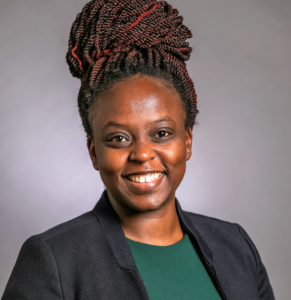Written by Juliet Nyanamba, Ph.D.
 I think of life as a canvas, initially blank, full of endless possibilities, and over time, together with the people around us, we get to paint a masterpiece. Some paint strokes are also added by environmental factors, experiences, and things beyond our control. As a developmental scientist, I’ve always been curious about influences during critical periods (especially early childhood through adolescence) in people’s lives and how these impact their developmental trajectories. This curiosity began as an emerging adult while I helped take care of my nephew in his early years. As any psychology undergraduate would, I tested many of the developmental psychology concepts I had learned in class on this fascinating little human (e.g., the marshmallow experiment on delayed gratification). I was mostly intrigued by his curiosity and motivation in the early years, how quickly he learned to speak, and how his mind went from processing concrete ideas to abstract concepts. His learning in these early years could be likened to random strokes on a canvas, exploring different media and tools while building a masterpiece. Unfortunately, I also saw how later on, structured learning and the rigorous demands of the education system took away the joy and dimmed the spark in his eye. Learning shifted from joyous exploration to structured, rote, and a performance done to fulfill external expectations.
I think of life as a canvas, initially blank, full of endless possibilities, and over time, together with the people around us, we get to paint a masterpiece. Some paint strokes are also added by environmental factors, experiences, and things beyond our control. As a developmental scientist, I’ve always been curious about influences during critical periods (especially early childhood through adolescence) in people’s lives and how these impact their developmental trajectories. This curiosity began as an emerging adult while I helped take care of my nephew in his early years. As any psychology undergraduate would, I tested many of the developmental psychology concepts I had learned in class on this fascinating little human (e.g., the marshmallow experiment on delayed gratification). I was mostly intrigued by his curiosity and motivation in the early years, how quickly he learned to speak, and how his mind went from processing concrete ideas to abstract concepts. His learning in these early years could be likened to random strokes on a canvas, exploring different media and tools while building a masterpiece. Unfortunately, I also saw how later on, structured learning and the rigorous demands of the education system took away the joy and dimmed the spark in his eye. Learning shifted from joyous exploration to structured, rote, and a performance done to fulfill external expectations.
Observing this trend in numerous other children compelled me to create interventions that supported learners’ curiosity, motivation, and well-being. Pursuing my MSc in Developmental Psychology, in Scotland, I was immersed in a preschool that used a play-based curriculum, was very child-centered, and offered choices from a very early age. Moreover, the teachers were very nurturing with their students and the school provided a lot of parent empowerment programs that promoted positive parent-child relationships. Coming to America for a Ph.D. in Developmental Science cemented my observation that the social environment greatly impacts learners’ motivation, persistence, and well-being. My research therefore centered around the impact that key social influencers, such as parents, teachers, and mentors, have on development. I learned to take a systemic perspective in studying development and particularly mental health outcomes.
More recently, in my postdoc experience, I have explored the impact of macro-systems in the cultural and historical context on youths’ development. As part of Dr. Velma McBride Murry’s Center for Advancing Racial-Ethnic Equity (CARE) for Families lab, I am exploring the impact of cultural stressors (e.g., discrimination, family stress) on African Immigrant youths’ development within a family context. Moreover, I look at cultural assets, resilience, and resistance factors that promote positive development despite adversity. In a secondary role, I work as a director of operations and community engagement core member in the Southeast Collaborative for Innovative and Equitable Solutions to Chronic Disease Disparities. Noting that mental health outcomes are intricately linked to physical health outcomes, this role is helping me build an interdisciplinary perspective as I explore the impact of cultural stressors on cardio metabolic health outcomes. As a Vanderbilt postdoc, I enjoy being surrounded by scholars who take a community-engaged perspective and use their research to empower communities. I am often reminded that “anything about a community, without the community, is not for the community” and this has greatly shifted my approach to research. My masterpiece is far from complete and I look forward to more collaborations that will enrich my professional journey.
Outside my professional realm, you will find me painting, hiking, playing pickle ball with friends, or supporting my favorite middle school and high school soccer teams (Valor Collegiate Academies) where my husband coaches.